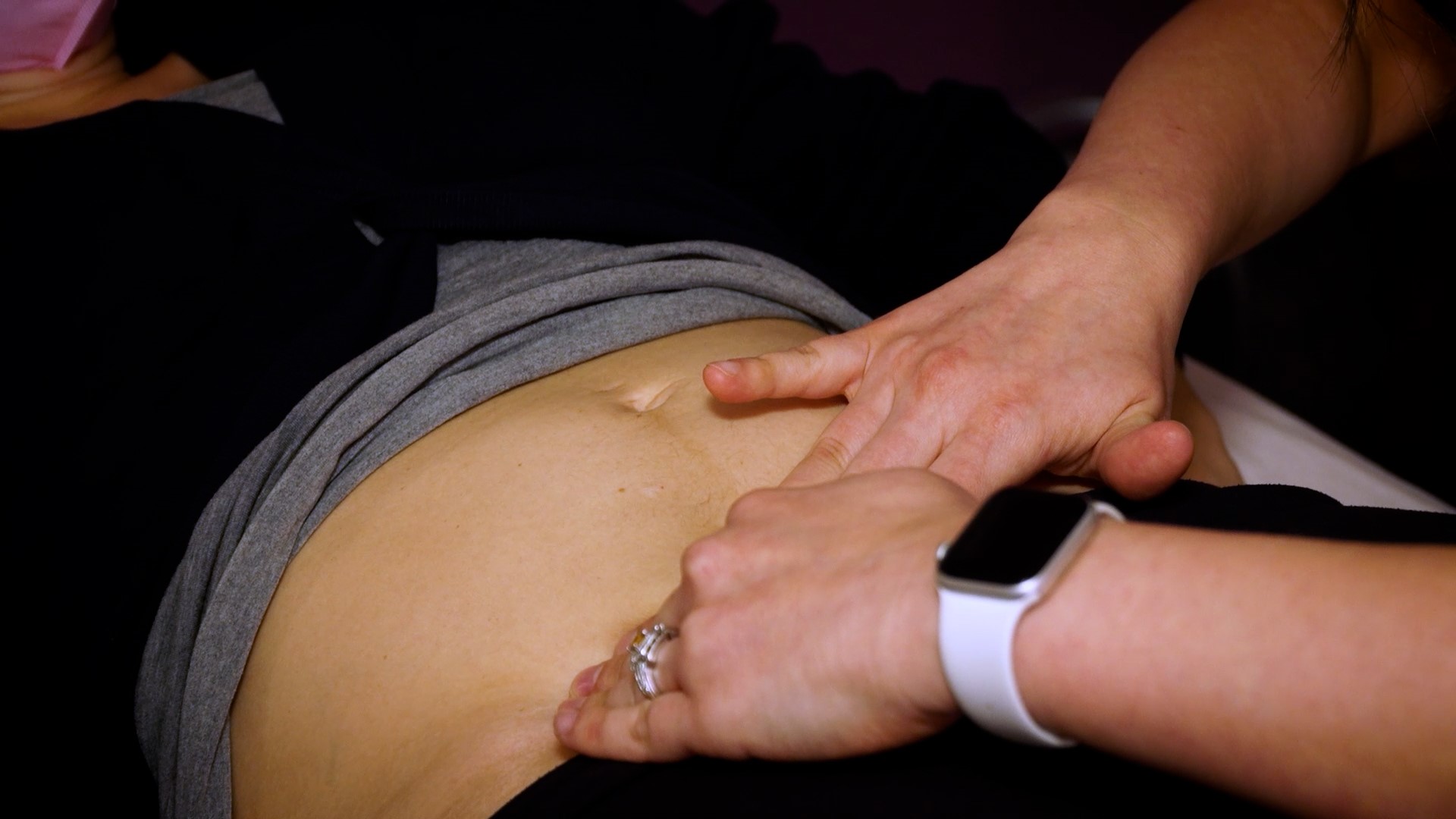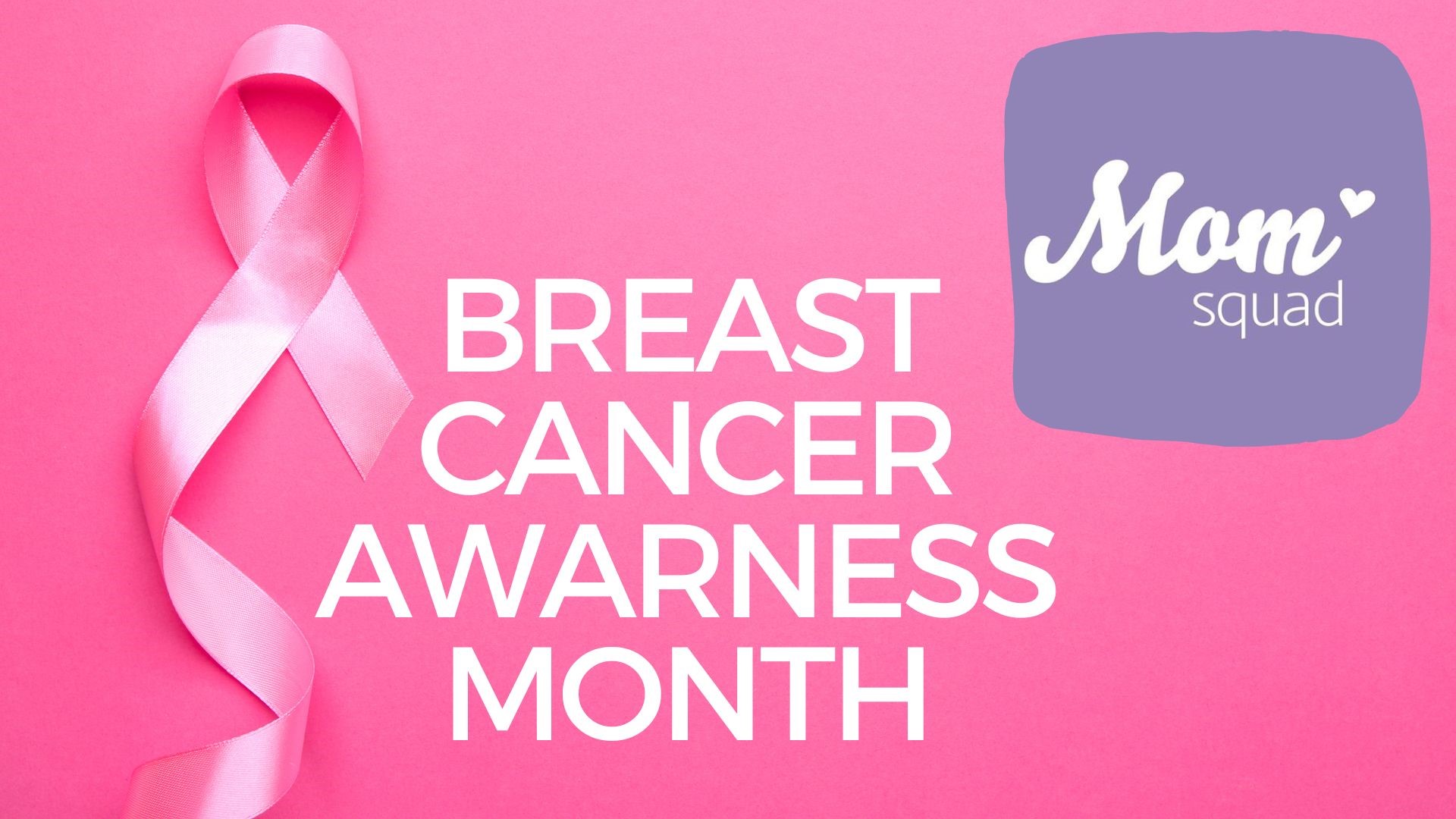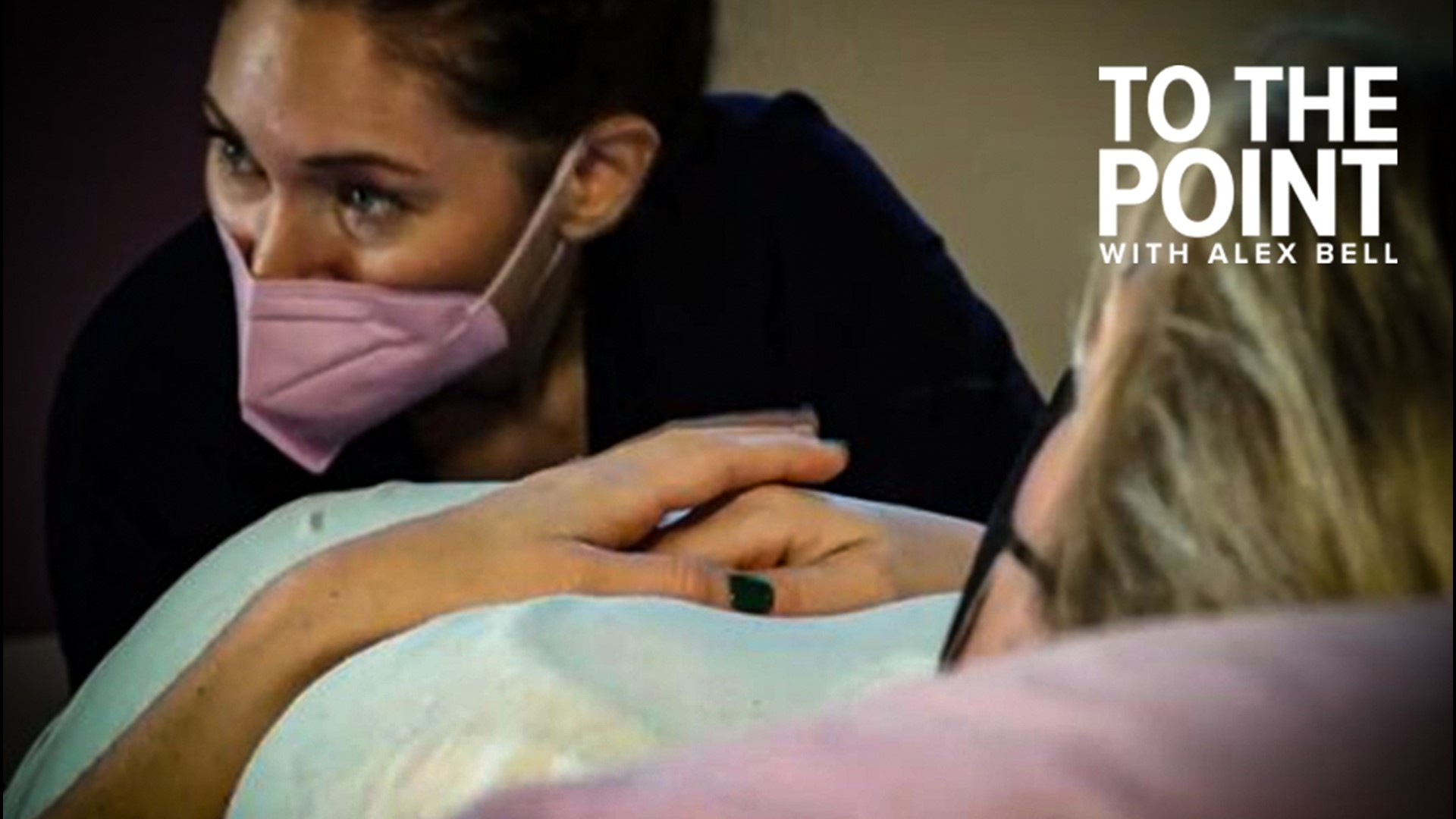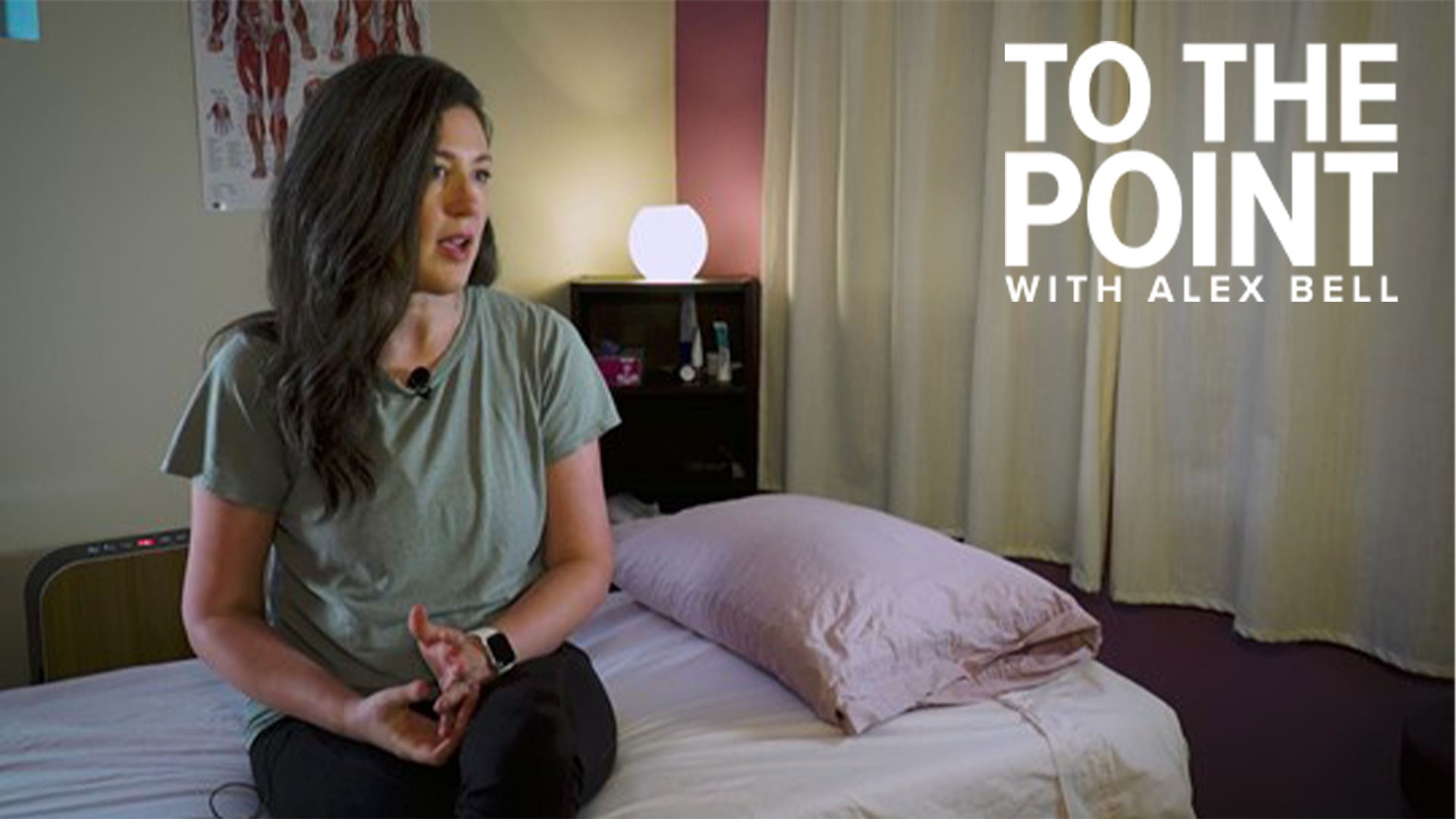Women's health: A look at pelvic floor therapy | To The Point
Pelvic floor pain in women is often overlooked, but it's not a fringe issue. It impacts one in four women.

Women's health is not talked about enough, especially for those who have given birth.
This week, ABC10's To The Point team is sharing real stories of women who took women’s healthcare matters into their own hands. They have been changing the birthing world because they feel no one should feel alone, embarrassed, or in pain.
In these stories, we are talking about pelvic floor therapy because it is a very common medical issue that goes overlooked. It can cause issues throughout the body.
Chapter 1 Meet Julie Kwong
Meet Julie Kwong
Below is a transcript of a video interview with Julie Kwong who is the owner of Lady Bits Physical therapy.
"I was married, trying to conceive, and after a year of trying, not successfully went down the fertility medical roads and found that we had unexplained infertility. That started a big journey about why, you know, why isn't my body working? So, I started taking courses in women's health, and I switched my career from working in skilled nursing with Alzheimer's patients to then working just solely with women and people with pelvic floor dysfunction.
I just had symptoms that I thought were weird, but I didn't know what they were. I was too ashamed and embarrassed to talk about them because we often are. I learned I had (a) tight hypertonic pelvic floor, but my symptoms were painful intercourse. I just thought that was normal. As I went to each course, and learned, oh, I have this dysfunction or that dysfunction, and then I got them treated. I thought, well, maybe I'll get pregnant.
Through the journey, I learned my purpose was to help other women. I started my business, Lady Bits Physical Therapy. Here at Lady Bits, we're pregnancy postpartum specialists. But in the pelvic health world, we have a saying once postpartum, always postpartum.
Pelvic floor physical therapy is a mouthful, and it doesn't conjure up beautiful, fun imagery, it's just heavy, and when you need this type of therapy, you're already feeling there's dread, there's an embarrassment, and the whole process can be icky. I just wanted to make it fun and light.
Typical postpartum care here in the U.S. is you have your baby, everyone lived, and they are discharged from the hospital. They say, 'See you in six weeks,' and you go back to your O.B. six weeks later, and they just take a speculum. So they don't often touch the perineum, they're not looking for scar tissue, they'll just open things up, check your cervix, you take a questionnaire to make sure you're not depressed, but no one's assessing your physical body. So, there's just so much missed.
Pelvic floors got stretched 250% times their normal length, and there's a lot of swelling that comes with that. Pelvic bones can be thrown out of alignment at birth, and a woman can have pain with trying to just move and get out of bed and try to walk or her tailbone could have had a major injury at birth.
A lot of women come in here thinking that all we do is the pelvic floor. So they won't even realize that they can talk about their core, their back pain, or their shoulder discomfort. But you know, having had a baby, and having been through all of that you're going to be impacted ... We're not just treating the pelvic floor.
We'll do visceral work here, all of our therapists have been trained. Visceral refers to organs, and the organs get smushed and moved around in pregnancy. Very often they don't end up where they used to be. So the intestines might kind of hang a little low because they just fell down. After that baby came out, everything kind of went south, and the organs can hang low leading to prolapse. But then the liver and stomach and lungs can be shoved up into the ribcage. So we'll do all this really gentle, visceral work that ends up actually restoring the ribcage.
I hear it all the time, 'Oh, I, I put on weight, you know,' or 'I haven't been exercising, and you know, I stopped going to the gym'. So then they blame themselves for having back pain, when there's a biomechanical cause of their back pain, it may be that their sacrum shifted in birth, and no one ever put it back, or their stomach muscles separate, and they didn't get the professional rehab to bring those muscles back together to support their back.
I've had many women tell me these really horror stories. So, women are having these really great, I think, needs that aren't even being talked about knowing you know, no one talks about these things. There's just not that many people who know the details of every little bit that happens and then how to fix it.
M.D.s are not biomechanical experts. That's not their job. I always tell women who are mad at their doctors, you know what your doctor's job is to save your life and to save the life of your baby. That is your doctor's job and they did their job, you're here. You may not feel the same as you used to. That's my job. So I used to actually get angry at doctors for not addressing all these issues. Now I realize you know what, they're doing their job and they're doing exactly what they went to school for. They're saving lives, and they're making sure everyone comes out alive. And so, you know, we have to have some layer of forgiveness, you don't know what you don't know, and you don't know what you're not taught.
To be able to touch their pain, especially women who've gone years without being able to have pain for you're in a course. I can easily go here's a spot and she just starts crying, because I validated her pain."
Julie recommends if you are experiencing pain that might be from a pelvic floor disorder, that you reach out to your health care provider or a pelvic floor therapist like Lady Bits that specializes in this kind of care."
This issue is not uncommon. According to Hing Health, a group focused on bridging the gap and offering more accessible pelvic floor therapy care, one in four women suffer from pelvic floor disorder.
Watch episode one:
Chapter 2 Meet Jenna Shaw-Battista
Below is a transcript of a video interview with Jenna Shaw-Battista, a patient at Lady Bits Physical therapy.
"I am a women's health nurse practitioner and certified nurse midwife. I've been in both for about 20 years now, and I work in both inpatient hospital settings as well as private practice clinics and public health clinics at federally qualified health centers.
For me, personally, I have been pregnant or breastfeeding most of the last 15 years. Like many people with multiple babies I noticed that my core strength and my pelvic floor strength just really declined over time.
After my last child was born, he was actually stillborn. I spent a lot of time afterward, you know, grieving, and my health took a little bit of a downward spiral, and I gained a lot of weight. As time went on, and my hormones changed, as I aged, and I started to feel a lot more relaxation on my pelvic floor, I just kind of always told myself, well, once you get back into shape, once you start doing yoga, again, you know, this will improve.
I was referring yet another postpartum patient to a pelvic floor therapist, and I realized I would never tell a patient to just lose weight to deal with her pelvic floor relaxation. That was ridiculously a lightbulb moment for me to actually, like, dedicate some time to this.
A lot of women, we just dismiss symptoms as part of life and don't put a lot of attention into it.
So coughing, sneezing, and laughing can make pee or sometimes even poop leak. It can also lead to a feeling of pelvic pressure and fullness and discomfort, and sometimes even impact sex and it can become painful. So those are all kinds of things that I have started routinely assessing for women in the postpartum period, which believe it or not, has not been the standard for that long.
I watched the introduction of electronic health records and kind of standard women's health chart note templates. There was no section for asking about incontinence or pelvic pain, or sexual pain. It's been something that has not been a focus of research, has not been a focus of care. It's really left a lot of women kind of suffering for years feeling like this is just the way that it is. I think too a lot of women feel like, well, you know, I had a cesarean so how could my pelvic floor be impacted. Now what we know, through research, is that a lot of the pelvic floor stretching and damage actually happens from the weight of the pregnancy.
I've had patients literally tell me that their life was changed, because things they didn't even know that was related to their pelvic floor weakness, suddenly improved.
To realize that women have been suffering for years. Yeah, it is why I'm a health care provider."
Watch episode two:
Chapter 3 Meet Andrea Johnson
Below is a transcript of a video interview with Andrea Johnson, an occupational therapist at Lady Bits Physical therapy.
"I've been a practicing occupational therapist for 15 years, and the majority of that time was spent in skilled nursing. Then after having my own children, I made the switch from women's health to pelvic health.
It kind of fell into my lap really in a way. I had been interested in postpartum care, birthing, and women's health since the birth of my daughter, my first child. Just realizing the void in care that I experienced, just not feeling like my needs had really been met and not even being sure what those needs were, just feels like totally vague and formalist. You had a baby, and now everyone cares about the baby. And you're like, oh, yeah, you're there, too, right? It doesn't feel like the same level of care that you get when you're pregnant is present after birth. At least it didn't for me.
I definitely had some pain. During pregnancy, I had pubic symphysis disorder, which is when the front of your pelvis kind of gets a little bit, not dislocated, but it shifts a little bit, which can be very uncomfortable, it can make walking painful, standing on one leg painful. So you're trying to put on your pants trying to put on your shoes, you just get this like sharp pain in the front of your pelvis. So I had that in both pregnancies and didn't know that it's normal, but it's something that is definitely treatable, and you don't have to suffer.
I just thought, oh, pregnancy, aches, and pains like this are normal. I completely wish that I had gone to a pelvic floor therapist to figure out my pain issues during pregnancy.
I think sometimes the emotional impact of labor and delivery is something that we kind of underestimate. Every birth is different so you can't really ever anticipate what's going to happen. There's an emotional component to it and a psychological component to it, that I think can sometimes be undervalued or under-addressed as well.
I think is really important, too, that everybody understands there's no gold medal for having a baby a certain way, right? You have a baby vaginally, you have a baby by C-section, and you have it with medication, without medication, there's no easy way to have a baby. There's no best way to have a baby except what's best for an individual person, right? Everybody has different life experiences coming into it, and therefore they have different needs. I think it's important that we hold space for all those different options and not you know, make this image of, you know, what's the right way to have a baby or what's a perfect birth. So, you just have to do the best you can and then have a little grace for yourself that how whatever it was you did it you made it through."
Watch episode four:
Chapter 4 Hinge Health
ABC10 sat down with Hinge Health – a healthcare group that is focused on bridging the gap and offering more access to pelvic floor therapy care.
Below is a transcript of a video interview with Inessa Lurye, senior director with Hinge Health.
"If you've ever heard these conversations, a woman talking and saying, 'Oh, I just leaked a little when I ran, laughed, jumped or sneeze', a third of women have that. That's urinary stress urinary incontinence, and that's something that can be addressed. If you think about pelvic pain or even pain with intercourse, 20% of women have pain with intercourse, that's a pelvic floor disorder that's worth bringing up to your physician.
Pelvic floor disorders occur when the muscles underneath the pelvis are loosened or weakened as a result of injury, trauma, or life stage.
We know that, on average, it takes women six and a half years to seek care because as we mentioned, these conditions have been so normalized.
The symptoms range across multiple life stages and fundamentally impact the quality of life. What we saw was that while this prevalence was so incredibly high, access to care was incredibly limited. Less than 7% of our PTs in this country are able to serve women with pelvic floor disorders. So it's really really hard to get care.
What happens during these disorders is people feel multiple different kinds of symptoms, whether it's pelvic pain or organ prolapse. Postpartum, it's very common that the abdominal muscles are separated.
They've been stretched and you've given birth, and that creates all sorts of pain and dysfunction, and pelvic floor physical therapy does a really good job very quickly to help strengthen those abdominal muscles.
So that's what we're doing. We're offering digital physical therapy for women accessible as soon as the next day to really address the root causes of these pelvic floor disorders and make sure that it is not just normalized and lived with but something that can be changed so women can get their lives back.
Hinge Health is the world's most patient-centered digital, muscular skeletal clinic.
There's a real live care team that every woman is assigned to. So they are assigned individually to pelvic floor physical therapists that are licensed to provide care in their state. They're also assigned to a health coach who is a board-certified health coach with specific background in training and women's health. That's their care team to guide them through the experience, and if there are any clinical escalations, we have a gynecologist on staff as well to guide our care teams. So these are real people helping drive your program, you meet through the app via video visit with your pelvic floor physical therapist, and they will do an assessment around your movement, your breathing, and your history, through your phone through the hinge health app.
If someone needs in-person care, we can help them navigate through care coordination, with someone that they could see.
(Currently) we are only providing the care virtually. We see women of all ages, impacted by these conditions.
It's not been addressed because there's a lot of stigmas, it's really hard to talk about urinary incontinence or painful intercourse - these topics haven't been addressed in the mainstream. That's one side of things. Secondly, is that there hasn't been much research in this area, you know, it's only been 30 years or less than 30 years, and we've been required to do clinical studies on women. So this area hasn't been focused on effectively. Then at the same time, there is a real lack of access, because it's a self-fulfilling prophecy. When we talk to physicians, they say, 'Well, yes, these issues come up (but) we have no one to refer to. So then we don't address these issues.' And it becomes a cycle of lack of access, stigma, and the issues being unaddressed and unaddressed time and time again, that's what has to stop.
In France, postpartum pelvic floor, physical therapy is the norm. Every woman gets 10 pelvic floor, physical therapist visits covered postpartum. This is the fundamental standard of care. In this country, not the case. So one of the things that we're doing with this program is making it so much more accessible."
Hinge Health is offered through employers. They say that if your employer doesn’t offer their programs, you can still reach out to your company and ask if they have services that address pelvic health.
Watch episode four:
























